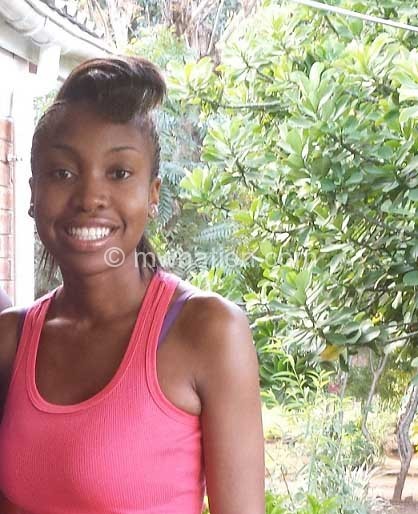Big Interview: Isabel Kumwembe
She does not wait for help, but finds it
Twenty-three year old Isabel Kumwembe is passionate about institutions of importance in the country and will not stand to see any of it deteriorate as long as she has the drive to revive them. Her quest for restoration has led her to dilapidated institutions of learning, alongside the grouping she founded two years ago while at Chancellor College (Chanco) and yet, her hunger grows to reach out further. Excerpts:
Tell me about yourself.
I am a young-woman on a mission. Distraught by the laissez-faire attitude by many towards playing a part in development issues and the love for my country, I founded the Chanco Project Rejuvenation; a student driven volunteer grouping aimed at rehabilitating dilapidated infrastructure at important institutions in Malawi. Since its inception, we have always emphasised on one thing; the unified power of the people and one’s inherent ability to affect change. I am a firm believer of upholding one’s social responsibility and an advocate for volunteerism. I believe volunteerism is a powerful means of engaging people in tackling development challenges. If development is to be effective and sustainable, the people affected by it must take ownership of its process and drive forward through civic engagement.
We are built on the spirit of volunteerism. There is no monetary reward. My philosophy is we should never be enslaved by the power of dependency and that everybody plays a part in building the nation we hope for.
How was your upbringing?
I was raised by my parents and I am the fourth born of five children. We have always been a close knit family, loving and supportive of one another. My parents have always emphasised on the importance of education and saw to it that we receive all the support to attain our educational goals. I was raised on Christian values and much of who I am stems from my belief in God. I was raised to believe that I am able to do all things; my parents and siblings always made me feel like a star.
What is your educational background?
I obtained my bachelors of social science Degree from Chanco in 2013. Prior to that, I was at Lilongwe Private Secondary School where I obtained my International General Certificate of Secondary Education (IGCSE). My primary school education comprised many transitions. I did my Grade One to Two at Bryanston Primary School in South Africa. I proceeded with my Standard Three at Bishop McKenzie Primary School and completed primary at Good Shepherd International School. I did my pre-schooling at Peter Pan in Zimbabwe where I was born.
How did you come up with the idea of this project?
Being a student at Chanco, I witnessed first-hand problems students face at the college. This is different from the perspective an outsider would have on various college issues. I knew that if I wanted to see change happen, it had to come from me. One of the greatest issues of concern has been the state of infrastructure. Chanco Project Rejuvenation was birthed out of frustration from the falling apart of infrastructure. The deterioration of infrastructure is an issue many of us complain about, but scarcely act on change. I felt it was long overdue for somebody to step up to the task and do something about it. I decided to be that person. I, however, could not do it alone and knew that there was power in numbers. A group of students- ready to rebuild their college – advocate for the return of its lost glory-was formed and our project established.
How many schools have you refurbished?
Since 2012, we have rehabilitated two lecture rooms at Chanco. Due to resource and financial constraints, we use a classroom by classroom approach. In July, we will be carrying out a new rehabilitation assignment at Mponda Primary School in Zomba.
Where do you get funding from?
We get our funding through grants, donations and fundraising. During my final year at Chanco, I was selected for a programme called students with dreams-a creative leadership programme designed for college students in Malawi. This is a programme under the Art and Global Health Centre Africa and provides seed grants (K150 000) to college students with ideas that will positively impact society. Through this grant, I founded the grouping. Within a month of its genesis, we raised K500 000, which we used to rehabilitate the lecture rooms. Upon publicity, Nico Life Insurance made a generous donation of one million kwacha, which we used to rehabilitate another lecture room. We are open to more funding opportunities.
From your experience, what are the major resource challenges in school?
Major learning challenges are closely related to one’s environment. Surroundings play a large role in either maximising or minimising optimal learning. Imagine a classroom with poor lighting and has no light bulbs. This will affect learners’ ability to see clearly and cause all sorts of problems. Another example is in relation to our current assignment; Mponda Primary School in Zomba. It does not have a complete brick wall due to inadequate resources and is located in the middle of town. Students are easily distracted by vehicles, people and many other happenings of town. Hence, lacking the resources to promote optimal learning environments is a severe threat to our learners.
What should be done to improve the situation?
I believe as Malawians, we must collaboratively work together to resolve problems that have simple solutions. We must eliminate the spirit of dependency and support one another where possible. For this to happen, government and various institutions must be transparent with people in areas of lack and needing support.
Why did you decide to take up a responsibility meant for government?
I feel the role needed support. I always question: “For how long will we wait for someone to sort out problems that affect us on a daily basis? If a window in my classroom is broken and I am freezing from the cold-must I wait for government to fix it? Will our egos truly allow us to suffer just to prove that somebody is not doing their job right? Have we carried laissez-faire attitudes so long that we unconsciously suppress our creative solutions to problems, which lay idle and unmentioned? Chanco Project Rejuvenation is here to do things differently. We are not here to remove the responsibility from government, but we are demonstrating.
Is this your career of just a hobby?
It is neither. I consider it a calling. Believe me; doing this work on a volunteer basis is difficult. It entails advocacy work, mobilisation, fundraising, time and energy. Often, I meet negative people and resistance. However, it is something I feel God has etched in my heart. For instance, the work required to rehabilitate the school is immense and the thought of attempting to fix it is scary. However, with the thought of one more child performing better because of improved lighting in the classroom or one less child being distracted by a broken windows-our hardships are borne with joy in our hearts.
Any last comments?
This year we are reaching out beyond the college and would like to volunteer our services to other important institutions. We chose Mponda Primary School for a multiplicity of reasons. As young leaders, it is important to uphold our social responsibility and feel the need to help others. With this in mind, we thought of sharing our passion with none other than Chanco future occupants. What better age to share our values than with this generation? Looking at local government funded primary schools in Zomba, many are in need of rehabilitation. Mponda is in a state of dilapidation. We are therefore fundraising this month and will use all proceeds to rehabilitate as much infrastructure as we can in July 2014. A new aspect we are adding to this assignment is community participation. Being the mammoth task that it is, we are calling for support from the corporate world, individuals and well-wishers. Join us today and please share the cause.






